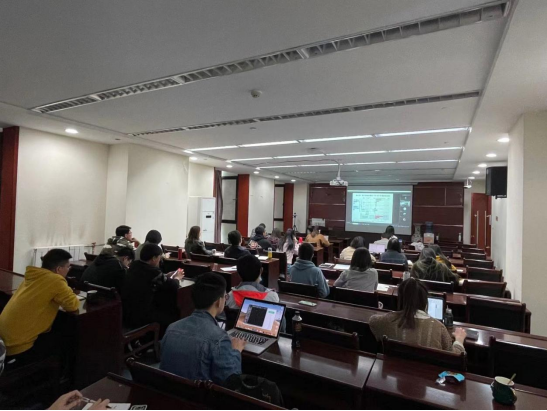professor piao shilong from the college of urban and environmental sciences of peking university and professor liao hong from the school of environmental science and engineering of nanjing university of information science & technology lectured on "introduction to climate change science" for postgraduate students on march 30th, 2021.
professor piao shilong's course, with the theme of "carbon cycle in terrestrial ecosystems", consisted of several main contents: an introduction to different terrestrial ecosystems; carbon cycling forms under different natural conditions; the way the carbon cycle works; the feedback of terrestrial ecosystem carbon cycle to climate change. professor piao introduced that the carbon cycle refers to the cyclic state of carbon elements in nature. carbon is the most important element of biological organisms, so the study of the carbon cycle in the ecosystem has become the core issue of energy flow in the system. the global carbon cycle and carbon budget are one of the core contents of current climate change and regional sustainable development research. the in-depth study of the global and regional carbon cycle not only provided a theoretical basis for understanding, mitigating and controlling global climate change, but also was closely related to other natural processes of terrestrial ecosystems, such as the water cycle and nutrient cycle. at the same time, it was related to biodiversity, human living environment and social sustainable development, such as energy utilization and industrial and agricultural production. professor piao introduced the changing trend and driving factors of global terrestrial vegetation growth in the past 30 years under the background of climate change. he believed that the rise of atmospheric carbon dioxide concentration was the main driving factor of global vegetation greening. human activities lead to large-scale use of fossil fuels, resulting in a significant impact on the carbon cycle, which may be an important cause of contemporary climate change. in terms of the feedback of global vegetation to climate change, professor piao mainly introduced the research progress of his research team on the feedback of global vegetation greening to climate change using remote sensing data and earth system models. professor piao's enthusiastic teaching style and his vivid teaching content deeply attracted the students.
professor liao hong's course was about "clouds and aerosols", which mainly covered several contents: the types and sources of aerosols; the formation and change process of aerosols; the climatological concentration of aerosol chemical components. professor liao introduced that aerosol is a colloidal dispersion system formed by small solid or liquid particles dispersed and suspended in the gas medium. the expression of aerosol on the process of climate change is very different in different climate models, and the process simulation is still unable to simulate the climate effect of aerosol well. among the drivers of climate change, the degree to which aerosols and clouds contribute to climate change remains the most uncertain part. professor liao also extended the past climate events to the forecast of the future climate change, which made the students feel the impact of climate change on their lives more deeply.

at the end of the class, the students thought actively and had a hot discussion with the professors. at the same time, the students asked some wonderful questions according to the content of the lecture. the whole teaching atmosphere was active and there were frequent interactions between teachers and students. the students said that the course was lively and interesting, and the teachers' enthusiastic narration touched the students, which made them deeply attracted by the relevant knowledge of climate change and benefited a lot.